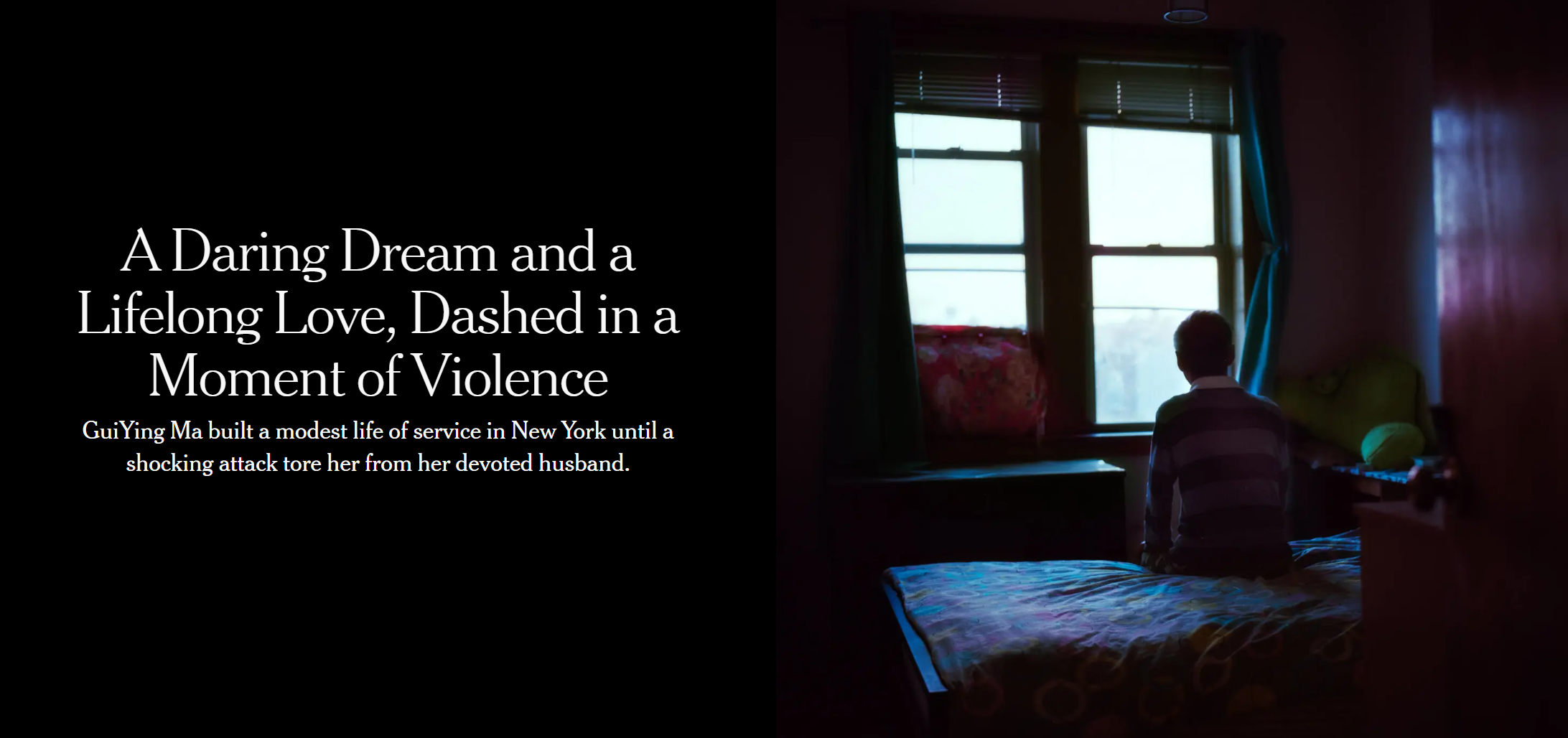Written Journalism Awards 2023
(Works Produced in 2022)
Excellence in Written Reporting, News: Corina Knoll
Excellence in Written Reporting, Features: Ruth Chizuko Murai
Excellence in Written Reporting, News - Works Produced in 2022
Corina Knoll, “A Daring Dream and a Lifelong Love, Dashed in a Moment of Violence,” The New York Times
ABOUT THE PROJECT: Corina Knoll’s powerful portrait of the man left behind when his wife was shockingly killed in an anti-Asian attack resonated far beyond the initial headlines. It brought the spate of attacks on Asian New Yorkers to life in a way that no other story we undertook last year did.
Corina had wanted to write about the violence against Asian people in a way that was universal, and where we could see how one incident really shattered someone’s world even as we were growing numb to the reports of anti-Asian attacks.
She began reporting the life of one attack victim, GuiYing Ma, and her husband, Zhanxin Gao. What she didn’t expect was that it would turn out to be a love story. “We don’t often see older Asian people written about like that,” Corina said.
The first person Corina won over wasn’t Mr. Gao. It was the couple’s landlord, who facilitated the introduction to Mr. Gao and set up the first interview. Corina had to invest time to win over Mr. Gao, who initially gave only short answers to her questions.
Slowly, Corina built up a relationship of trust with Mr. Gao over four interviews. She attended the wife’s funeral. He began to open up in a way she doesn’t often encounter with older Asian immigrants. “I wonder if at that point he already felt like there was nothing to lose,” she said.
Mr. Gao’s landlord sent Corina videos of Mr. Gao with his wife in the hospital, and Corina recruited an interpreter, Lenny Yang, to help translate the videos. Corina and Lenny would watch the videos together over FaceTime and he would interpret them for her. The process of translation doubled the reporting time.
The result was a story that took readers inside the lives of this couple from China to Queens, and how a community sprung up to support them.
GuiYing Ma’s life story, thanks to Corina’s reporting and storytelling, was about far more than her violent end.
Nearly 400,000 people read the story, with engaged time showing that it was read deeply.
“I hope every single person reads this heartrending profile of a generous and decent couple who loved each other, their son, and their Queens neighbors,” Min Jin Lee, author of the book “Pachinko,” wrote on Twitter.
Michael Luo, the New Yorker editor, wrote, “This story by @corinaknoll is so important. As someone who has been immersed in the anti-Asian violence of the 19th century, I’ve felt acutely the absence of immigrant voices from the archives. This story ensures that Guiying Ma’s will not be.”
Judges’ comments: “Corina's reporting about an elderly Asian woman who lost her life, and the elderly husband she left behind, is at once striking, beautiful, and heartbreaking. It clearly shows from the intimate portrait Corina paints that Corina went the required distance to gain the trust of her main source and write about a very difficult subject. It's a beautiful story and very human way of covering the tragic anti-Asian crimes. The care is felt in the words.”
RUNNER-UP: Simar Bajaj, "A New, Transparent AI Tool May Help Detect Blood Poisoning," Undark, and Jessica Prois, Dennis Romero, Tony Lee, Kimmy Yam and Hanna Park, “Dallas salon shooting” (1/2/3), NBC News
Corina Knoll
(Los Angeles bureau chief, The New York Times)
CORINA KNOLL is the Los Angeles bureau chief for The New York Times. She was previously a Metro reporter for The Times. Before that, she spent more than a decade with The Los Angeles Times, where she helped investigate a county sheriff’s secret list of problem officers and how they obstructed justice. She was on the team that investigated corruption in Bell, Calif. — coverage that won the 2011 Pulitzer Prize for public service.
Excellence in Written Reporting, Features - Works Produced in 2022
Ruth Chizuko Murai, “My Family Lost Our Farm During Japanese Incarceration. I Went Searching for What Remains,” Mother Jones
ABOUT THE PROJECT: This essay was published for the 80th anniversary of Executive Order 9066, which authorized the incarceration of 126,000 Japanese Americans, a part of American history which is often forgotten by the wider public. The personal nature of the story allowed our audience to connect with this history in a way they might not have before, and understand the impact the incarceration continues to have on the generations that were born after the war. To date, this essay has received 30,000 page views with an engaged time average of 16 minutes. It also was recorded and read aloud by Audm. The essay was featured in several influential newsletters, including The Ann Friedman Weekly, Politico’s California Playbook, and AAJA’s own newsletter. The essay was also included on Phil Yu’s Angry Asian Man blog list of things to read. Cecilia Tsu, a professor at UC Davis who Murai interviewed for the story, added it to her Asian American history syllabus, writing to Murai, “The local history angle will be of interest to UC Davis students; people around here know little about the Japantown in Sacramento that no longer exists.” On a personal level, the publication of this essay was extremely impactful for the rest of the Murai family. Many of the second generation cousins who read the piece actually learned details about their family they had never known, due to the culture of silence around incarceration. Opening up a dialogue with these family members allowed for the little history that was known to finally be recorded, ending the continued erasure of this shared history.
Judges’ comments: “This story told the history of Japanese incarceration beautifully through the lens of one family, sharing all that was lost in personal and more broadly cultural ways without being didactic.”
RUNNER-UP: Marian Chia-Ming Liu, “The Power of Reclaiming My Asian Name,” The Washington Post
Ruth Chizuko Murai
(Senior Fellow, Mother Jones)
RUTH CHIZUKO MURAI is the Research Editor at Mother Jones, where she manages a team fact-checking the news organization’s stories. She joined Mother Jones in December 2021 as an editorial fellow, and later was promoted to Senior Fellow. Prior to that, Murai worked for more than three years at Jane Doe Films, where she served as Associate Producer on two documentaries about sexual misconduct: On the Record and Allen v. Farrow.




